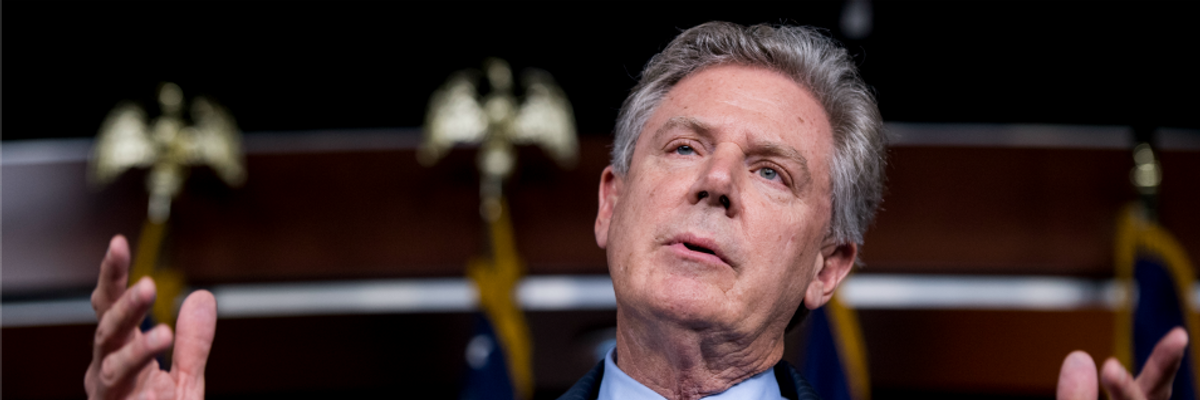Two environmental groups published an analysis Monday that calls a national climate plan unveiled earlier this month by the Democratic chair of the House Energy and Commerce Committee "extremely disappointing" and "a failure of climate leadership."
"Chairman Pallone's plan is a gift to Big Oil and a recipe for another generation of fracking."
--Lukas Ross, Friends of the Earth
The analysis (pdf) from Friends of the Earth U.S. and the Partnership for Policy Integrity details the "dirty secrets" of a legislative framework for the draft Climate Leadership and Environmental Action for our Nation's (CLEAN) Future Act, which Rep. Frank Pallone (D-N.J.). announced on Jan. 8 with other members of his committee and discussed at an event in New Jersey the following week.
A memo (pdf) from Pallone's office about the CLEAN Future Act explains that the Energy and Commerce Committee "will continue to develop and refine" the legislative proposal in the coming months. It notes that "there are several important policy areas that are not yet included in the draft bill" and welcomes "policy solutions from across the political spectrum."
Broadly, Pallone's climate plan--which came after 15 committee hearings about the human-caused crisis--aims to enable the United States to achieve net-zero greenhouse gas pollution by 2050. It would direct all federal agencies to use their existing authorities to meet that goal, and includes provisions for the power, building, transportation, and energy sectors.
The proposal would require states to develop plans to meet the 2050 target that must take into account the needs of communities on the front lines of the climate crisis. It would also establish a first-of-its-kind National Climate Bank to help states, municipalities, and companies transition.
"Record wildfires, flooding, heatwaves, and drought have spelled out a dire reality: the climate crisis is here, and we can no longer afford to address this crisis along the margins. Today we are providing the kind of serious federal leadership this moment requires," Pallone said when he introduced the plan. "For the sake of the American people, the long-term sustainability of our economy, and public health, we must act boldly, and that is exactly what we intend to do."
Despite the congressman's passionate rhetoric about the need for ambitious climate action, the new analysis explains how "the Pallone proposal is a failure of climate leadership in at least five key regards."
- The Pallone standard sets a target rate for carbon intensity at 1,807 CO2e lbs/MWh, nearly twice as dirty as the current national average. This is a significant failure of ambition at a time of climate crisis.
- Beginning from this dangerously lax definition of clean energy, the plan leaves the door wide open for fracked gas and potentially even some coal to qualify as "clean."
- The proposed target for emissions intensity is significantly less ambitious than the 2030 targets in the Clean Power Plan, the Obama administration's signature regulations under the Clean Air Act.
- The proposed Pallone target is barely more stringent than emission standards recently proposed by the Trump administration for supercritical coal plants.
- If the Pallone proposal is similar to existing emissions trading systems, it will likely include a loophole for woody biomass, effectively allowing massive emissions from burning wood to be treated as carbon neutral.
Based on these points, the analysis concludes that "this framework should really be called the Dirty Future Act. In every way possible, Pallone's proposal fails to address the climate crisis, which is extremely disappointing considering the congressman considers himself to be an environmental leader."
"Actual climate leadership would involve goals to achieve 100% clean renewable energy for the electricity and transportation sectors by no later than 2030 and the complete decarbonization of the economy by 2050, at the latest," says the analysis. "It would simultaneously prioritize a just transition for workers, justice for front-line communities, and reduce our share of global emissions in line with our disproportionate historic contribution."
"Pallone was right about one thing, now is the time for bold action," the analysis adds. "We just need something dramatically better than the so-called CLEAN Future Act."
Pallone has faced pressure from climate activists in New Jersey and on Capitol Hill for not supporting the Green New Deal resolution introduced by Rep. Alexandria Ocasio-Cortez (D-N.Y.) and Sen. Ed Markey (D-Mass.) in February 2019. The GOP-majority Senate voted down the resolution in March but the Democrat-controlled House has yet to vote on it.
As The Hillreported last year, the CLEAN Future Act is seen as a "competing plan" to the Green New Deal. Rep. Paul Tonko (D-N.Y.), a member of the House committee who helped settle on the 2050 timeline, told The Hill that "we can do any kind of whimsical thing but we have to do this in a way that includes conversations with stakeholders, their buy-in, and their involvement in a consensus bill."
In a statement announcing the new analysis Monday, activists at the environmental groups presented the committee's plan as too friendly to the fossil fuel industry and urged House Democrats to consider more aggressive measures to combat the climate crisis.
"This looks like quite a lot of fossil fuel for a clean energy standard," said Lukas Ross, senior policy analyst at Friends of the Earth. "We have a decade left to prevent the worst of the climate crisis and the Democrats are recycling inadequate emissions-trading gimmicks from years ago. Chairman Pallone's plan is a gift to Big Oil and a recipe for another generation of fracking."
"We're running out of time to make the steep emissions cuts necessary to prevent climate catastrophe," warned Laura Haight, U.S. policy director at the Partnership for Policy Integrity. "Chairman Pallone and House Democrats need to set far more ambitious climate protection goals than this."

